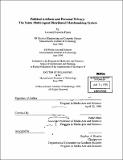Political artifacts and personal privacy : the Yenta multi-agent distributed matchmaking system
Author(s)
Foner, Leonard Newton
DownloadFull printable version (11.43Mb)
Other Contributors
Massachusetts Institute of Technology. Dept. of Architecture. Program In Media Arts and Sciences.
Advisor
Pattie Maes.
Terms of use
Metadata
Show full item recordAbstract
Technology does not exist in a social vacuum. The design and patterns of use of any particular technological artifact have implications both for the direct users of the technology, and for society at large. Decisions made by technology designers and implementors thus have political implications that are often ignored. If these implications are not made a part of the design process, the resulting effects on society can be quite undesirable. The research advanced here therefore begins with a political decision: It is almost always a greater social good to protect personal information against unauthorized disclosure than it is to allow such disclosure. This decision is expressly in conflict with those of many businesses and government entities. Starting from this premise, a multi-agent architecture was designed that uses both strong cryptography and decentralization to enable a broad class of Internet-based software applications to handle personal information in a way that is highly resistant to disclosure. Further, the design is robust in ways that can enable users to trust it more easily: They can trust it to keep private information private, and they can trust that no single entity can take the system away from them. Thus, by starting with the explicit political goal of encouraging well-placed user trust, the research described here not only makes its social choices clear, it also demonstrates certain technical advantages over more traditional approaches. We discuss the political and technical background of this research, and explain what sorts of applications are enabled by the multi-agent architecture proposed. We then describe a representative example of this architecture--the Yenta matchmaking system. Yenta uses the coordinated interaction of large numbers of agents to form coalitions of users across the Internet who share common interests, and then enables both one-to-one and group conversations among them. It does so with a high degree of privacy, security, and robustness, without requiring its users to place unwarranted trust in any single point in the system.
Description
Thesis (Ph.D.)--Massachusetts Institute of Technology, School of Architecture and Planning, Program in Media Arts and Sciences, 1999. Includes bibliographical references (p. 119-128).
Date issued
1999Department
Program in Media Arts and Sciences (Massachusetts Institute of Technology)Publisher
Massachusetts Institute of Technology
Keywords
Architecture. Program In Media Arts and Sciences.